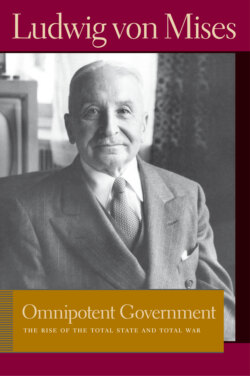Читать книгу Omnipotent Government - Людвиг фон Мизес - Страница 20
На сайте Литреса книга снята с продажи.
6. The Lassalle Episode
ОглавлениеIt would be possible to deal with the Prussian Constitutional Conflict without even mentioning the name of Ferdinand Lassalle.2 Lassalle’s intervention did not influence the course of events. But it foreboded something new; it was the dawn of the forces which were destined to mold the fate of Germany and of Western civilization.
While the Prussian Progressives were involved in their struggle for freedom, Lassalle attacked them bitterly and passionately. He tried to incite the workers to withdraw their sympathies from the Progressives. He proclaimed the gospel of class war. The Progressives, as representatives of the bourgeoisie, he held, were the mortal foes of labor. You should not fight the state but the exploiting classes. The state is your friend; of course, not the state governed by Herr von Bismarck but the state controlled by me, Lassalle.
Lassalle was not on the pay roll of Bismarck, as some people suspected. Nobody could bribe Lassalle. Only after his death did some of his former friends take government money. But as both Bismarck and Lassalle assailed the Progressives, they became virtual allies. Lassalle very soon approached Bismarck. The two used to meet clandestinely. Only many years later was the secret of these relations revealed. It is vain to discuss whether an open and lasting coöperation between these two ambitious men would have resulted if Lassalle had not died very shortly after these meetings from a wound received in a duel (August 31, 1864). They both aimed at supreme power in Germany. Neither Bismarck nor Lassalle was ready to renounce his claim to the first place.
Bismarck and his military and aristocratic friends hated the liberals so thoroughly that they would have been ready to help the socialists get control of the country if they themselves had proved too weak to preserve their own rule. But they were—for the time being—strong enough to keep a tight rein on the Progressives. They did not need Lassalle’s support.
It is not true that Lassalle gave Bismarck the idea that revolutionary socialism was a powerful ally in the fight against liberalism. Bismarck had long believed that the lower classes were better royalists than the middle classes.* Besides, as Prussian minister in Paris he had had opportunity to observe the working of Caesarism. Perhaps his predilection toward universal and equal suffrage was strengthened by his conversations with Lassalle. But for the moment he had no use for Lassalle’s coöperation. The latter’s party was still too small to be considered important. At the death of Lassalle the Allgemeine Deutsche Arbeiterverein had not much more than 4,000 members.†
Lassalle’s agitation did not hinder the activities of the Progressives. It was a nuisance to them, not an obstacle. Neither had they anything to learn from his doctrines. That Prussia’s Parliament was only a sham and that the army was the main stronghold of Prussia’s absolutism was not new to them. It was exactly because they knew it that they fought in the great conflict.
Lassalle’s brief demagogical career is noteworthy because for the first time in Germany the ideas of socialism and etatism appeared on the political scene as opposed to liberalism and freedom. Lassalle was not himself a Nazi; but he was the most eminent forerunner of Nazism, and the first German who aimed at the Führer position. He rejected all the values of the Enlightenment and of liberal philosophy, but not as the romantic eulogists of the Middle Ages and of royal legitimism did. He negated them; but he promised at the same time to realize them in a fuller and broader sense. Liberalism, he asserted, aims at spurious freedom, but I will bring you true freedom. And true freedom means the omnipotence of government. It is not the police who are the foes of liberty but the bourgeoisie.
And it was Lassalle who spoke the words which characterize best the spirit of the age to come: “The state is God.”‡
